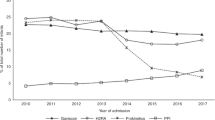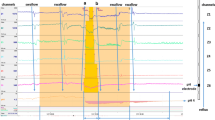Abstract
Symptoms of gastro-oesophageal reflux disease (GORD or GERD) are estimated to occur in 30–50% of pregnancies, with the incidence approaching 80% in some populations. As with many other conditions in pregnancy, medical therapy with pharmaceutical agents is a concern, as the potential teratogenicity of medications is not well known. Although prevalence numbers are high, many patients have mild and infrequent symptoms, which often respond to lifestyle and dietary modifications. The exact mechanism and pathogenesis of GERD associated with pregnancy is likely multifactorial. Treatment strategies for patients not responding to conservative therapies include a step-up approach initially starting with antacids and alginates, and progressing to histamine H2 receptor antagonists followed by proton pump inhibitor (PPI) therapy if indicated by symptoms. Although PPI therapy is the most effective treatment available for GERD, the data related to the safety for use during pregnancy and postpartum breastfeeding are mostly obtained from cohort analysis. Given the significant adverse impact of GERD on quality of life and functionality, the use of this class of medications should not be overly restricted based solely on the pregnancy. Based on the studies presented, exposure to PPI therapy during pregnancy seems to predispose the fetus to minimal risk and, overall, these medications should be discussed with the primary physician if symptomatically necessary in the pregnant patient. This evidence-based review will address the management and safety of PPI therapy during pregnancy and lactation, and briefly review the pathogenesis, clinical presentation and diagnosis of GERD in this population.

Similar content being viewed by others
References
Raghunath AS, O’Morain C, McLoughlin RC. Review article: the long-term use of proton-pump inhibitors. Aliment Pharmacol Ther 2005; 22 Suppl. 1: 55–63
Richter JE. Gastroesophageal reflux disease during pregnancy. Gastroenterol Clin NA 2003; 32: 235–61
Ali R, Egan L. Gastroesophageal reflux disease in pregnancy. Best Pract Res Clin Gastroenterol 2007; 21: 793–806
Broussard C, Richter J. Treating gastro-oesophageal reflux during pregnancy and lactation: what are the safest therapy options? Drug Saf 1998; 19: 325–37
Mahadevan U. Gastrointestinal medications in pregnancy. Best Pract Res Clin Gastroenterol 2007; 21: 849–77
Barr W. Heartburn in pregnancy. J Obstet Gynecol British Empire 1958; 65: 1019–21
de Castro LP. Reflux esophagitis as the cause of heartburn in pregnancy. Am J Obstet Gynecol 1967; 98: 1–10
Marrero JM, Goggin PM, de Caestecker JS, et al. Determinants of pregnancy heartburn. Br J Obstet Gynaecol 1992; 99: 731–4
Katz PO, Castell DO. Gastroesophageal reflux disease during pregnancy. Gastro Clin NA 1998; 27: 153–67
VanThiel DH, Gavaler JS, Joshi SN, et al. Heartburn of pregnancy. Gastroenterology 1977; 72: 668–78
Lind JF, Smith AM, McKiver DK, et al. Heartburn in pregnancy: a manometry study. CMAJ 1968; 98: 571–4
Ulmsten U, Sundstrom G. Esophageal manometry in pregnant and nonpregnant women. Am J Obstet Gynecol 1978; 132: 260–4
Wald A, Van Thiel DH, Hoechstetter BS, et al. Effects of pregnancy on gastrointestinal transit. Dig Dis Sci 1982; 27: 1015–8
Cappell MS. Sedation and analgesia for gastrointestinal endoscopy during pregnancy. Gastro Endo Clinics 2006; 16(1): 1–31
Capell MS, Colon VJ, Sidhom OA. A study of eight medical centers on the safety and clinical efficacy of esophagogastroduodenoscopy in 83 pregnant females with follow-ups of fetal outcome and with comparison to control groups. Am J Gastroenterol 1996; 91: 348–54
Qureshi WA, Rajan E, Adler DG, et al. ASGE guideline: guidelines for endoscopy in pregnant and lactating women. Gastrointest Endosc 2005; 61(3): 357–62
Gill SK, O’brien L, Einarson T, et al. The safety of proton pump inhibitors (PPIs) in pregnancy: a meta-analysis. Am J Gastro 2009; 104: 1541–5
Pasternak B, Hviid A. Use of proton-pump inhibitors in early pregnancy and the risk of birth defects. N Engl J Med 2010; 363(22): 2114–23
The Swedish Association of the Pharmaceutical Industry. FASS — the Swedish Medicines Information Engine [online]. Available from URL: http://www.lif.se/default.aspx?id=31983 [Accessed 2011 Dec 15]
Friedman JM, Polifka JE. Teratogenic effects of drugs: a resource for clinicians (TERIS). 2nd ed. Baltimore (MD): The Johns Hopkins University Press, 2000: 516
Kallen B. Use of omeprazole during pregnancy: no hazard demonstrated in 955 infants exposed during pregnancy. Eur Obstet Gynecol Reprod Biol 2001; 96(1): 63–8
Kallen B. Drugs during pregnancy. New York: Nova Biomedical Books, 2009: 39–47
Lalkin A, Loebbstein R, Addis A, et al. The safety of omeprazole during pregnancy: a multicenter prospective controlled study. Am J Obstet Gynecol 1998; 179: 727–30
Ruigomez A, Rodriguez LUG, Cattaruzzi C, et al. Use of cimetidine, omeprazole, and ranitidine in pregnant women and pregnancy outcomes. Am J Epidemiol 1999; 150: 476–81
Nielsen GL, Sorensen HT, Tage-Jensen A, et al. The safety of proton pump inhibitors in pregnancy. Aliment Pharmacol Ther 1999; 13: 1085–9
Prilosec [product information]. Wilmington (DE): AstraZeneca, 2011
Prevacid [product information]. Lake Forest (IL): TAP Pharmaceuticals, 2008
Esomeprazole [product information]. Wilmington (DE): AstraZeneca, 2010
Dexilant [product information]. Deerfield (IL): Takeda Pharmaceuticals, 2011
Protonix [product information]. Philadelphia (PA): Wyeth Pharmaceuticals, 2010
Aciphex [product information]. Raritan (NJ): PRICARA, 2010
Marshall JK, Thomason ABR, Armstrong D. Omeprazole for refractory gastroesophageal reflux disease during pregnancy and lactation. Can J Gastroenterol 1998; 12: 225–7
Diav-Citran O, Arnon J, Shechtman S, et al. The safety of proton pump inhibitors in pregnancy: a multicentre prospective controlled study. Aliment Pharmacol Ther 2005; 21: 269–75
Matok I, Gorodischer R, Koren G, et al. The safety of intrauterine exposure to proton pump inhibitors during the first trimester of pregnancy [abstract]. The IXth World Conference on Clinical Pharmacology and Therapeutics; 2008 Jul 27–Aug; Quebec City (QC)
Nikfar S, Abdollahi M, Moretti M, et al. Use of proton pump inhibitors during pregnancy and rates of major malformations: a meta-analysis. Dig Dis Sci 2002; 47: 1526–9
Nielson G, Sorenson H, Thulstrup A, et al. The safety of proton pump inhibitors in pregnancy. Aliment Pharmacol Ther 1999; 12: 1085–9
Revicki DA, Zodet MW, Joshua-Gotlib S, et al. Health-related quality of life improves with treatment-related GERD symptom resolution after adjusting for baseline severity. Health Qual Life Outcomes 2003; 1: 73
Acknowledgements
Dr Johnson reports clinical grants from AstraZeneca and Takeda Pharmaceuticals. He is a clinical investigator for AstraZeneca and Takeda Pharmaceuticals and a consultant for AstraZeneca, Takeda, Esai and Xenoport. He is also on the speakers bureau for Takeda Pharmaceuticals. Dr Majithia discloses no conflicts of interest relating to this article. No sources of funding were used to conduct this study or prepare this manuscript.
Author information
Authors and Affiliations
Corresponding author
Rights and permissions
About this article
Cite this article
Majithia, R., Johnson, D.A. Are Proton Pump Inhibitors Safe during Pregnancy and Lactation?. Drugs 72, 171–179 (2012). https://doi.org/10.2165/11597290-000000000-00000
Published:
Issue Date:
DOI: https://doi.org/10.2165/11597290-000000000-00000




